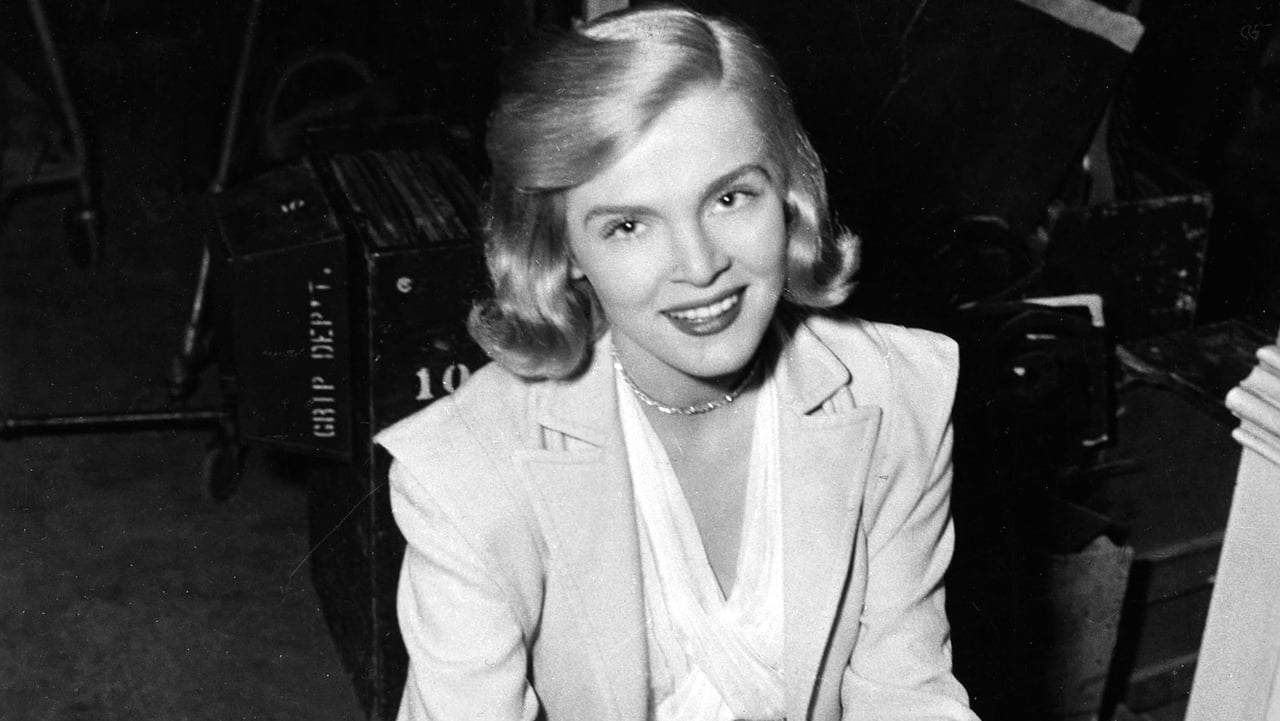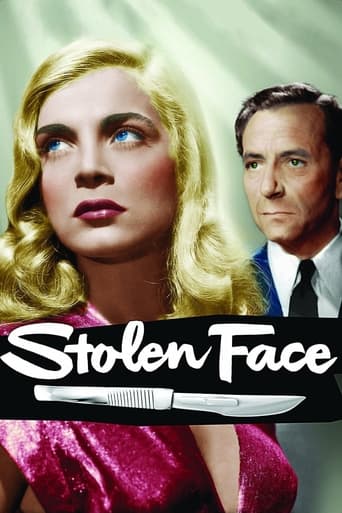

It's not on the same level as the best early 1950s Hammer films that I have seen such as "The Last Page" or "Mantrap" - both of which were also directed by Terence Fisher - but it's a good little thriller which packs quite a bit into its 70 minutes runtime. It concerns a plastic surgeon, Philip Ritter, who alters the appearance of a disfigured habitual criminal, Lily Conover, to recreate a beautiful woman, Alice Brent, with whom he had a brief but intense romance. It can be seen as a precursor to "Vertigo" as well as Fisher's later (and lesser) Hammer films "Four Sided Triangle" and "Frankenstein Created Woman", which cover similar territory from a sci-fi / horror perspective.The film has a great leading man in the effortlessly classy and charismatic Austrian actor Paul Henreid. Best known for his supporting roles in "Goodbye, Mr. Chips" and "Casablanca", he was the most high profile male Hollywood star to ever grace a Hammer film and the most high profile overall after Bette Davis and Joan Fontaine. Lizabeth Scott, who only died in January, is not a great actress but she is perfectly fine as Alice. When playing Lily, her voice is dubbed by the original actress Mary Mackenzie so I can't really gauge Scott's performance but Mackenzie is a much better actress. It also features nice supporting roles from André Morell, my favourite Hammer leading man after Christopher Lee and Peter Cushing, in his first film for the studio and future "Dad's Army" star Arnold Ridley as well as a small appearance by Richard Wattis, who does not play a civil servant for once! This has nothing to do with my enjoyment of the film itself but I was a little disappointed that the John Wood in the film was not, contrary to what it said on both Wikipedia and IMDb, the Shakespearean actor who is best known for playing Stephen Falken in "WarGames".Overall, this is by no means a Hammer classic but it's great fun.
... View MoreWhen famed plastic surgeon Dr. Philip Ritter (Paul Henreid) is visited by a wealthy aging client, he refuses to service her, knowing that her advanced years and already damaged skin would make surgery pointless. He instead prefers the type of surgery necessary to either improve one's life (as in the case of his youthful poor client he has no problem in waiting for payment from) or the embittered career criminal damaged during the war who has psychologically been damaged as well. Lily Conover (Mary Mackenzie) is a woman so embittered by her scarred face that getting out of prison is only a temporary reprieve for, and a return to her life of crime is only a matter of time. He decides to take on her case as he falls in love with the beautiful Alice Brent (Lizabeth Scott), a gentle renowned concert pianist he treats for a bad cold while she is on hiatus from a world tour. When Alice leaves him to continue her tour, he is so broken up by her departure that he utilizes her facial structure to re-make Lily into her image, certain that beauty will change her criminal ways. But you can't turn a rhinestone into a ruby, and after Phillip marries her, he discovers the unfortunate truth, just as Alice returns....This isn't one of the all-time great film noir, but you can't help but be riveted by the transition of Lily from Mackenzie into Scott. Even her voice all of a sudden changes into that of the sweet Alice (abliet with cockney accent) and it is truly amusing to watch her continue her life of crime even though she really has no reason to. I guess the film is saying that a sow's ear will never become a silk purse, even if it is lined with gold. Trashy she was, and trashy she remains, using her new-found beauty for free love even as she holds onto her abused husband. Scott does utilize a fairly convincing cockney accent as she takes over the role, and there is no denial of who is Lily and who is Alice as their differences in fashion-wear is more obvious. Henreid, who had a similar film ("Hollow Triumph") several years before, shows a variety of emotions as he realizes what a mistake he made and why there is a rule that you never become involved with a patient. This film will never resemble reality, but it is certainly engrossing.
... View MoreLizabeth Scott has "A Stolen Face" and also has the face that was stolen in this 1952 film also starring Paul Henreid and directed by Terence Fisher. Scott plays a beautiful concert pianist, Alice Brent, who meets Dr. Philip Ritter (Henreid), a plastic surgeon, while he's on vacation. They fall in love, but she leaves suddenly. She's involved with her manager and rather than confront the situation, she just takes off.Devastated, Ritter returns to his practice, part of which is done at a prison where he reconstructs patients' injured or deformed faces to help them rehabilitate and live better, crime-free lives. One such patient is Lily Conover (Mary Mackenzie), a thief whose face is disfigured on one side. Ritter makes her over to look like Alice Brent and marries her. Lily, however, can't quite rehabilitate. She feels stifled by the doctor's lifestyle and starts stealing and hanging with her old crowd. Then Alice Brent decides she can't marry her manager and pays Philip a visit.This film could be considered a camp classic - the story is, but the performances are quite good. Until he returns from vacation, Dr. Ritter is a fine doctor, totally professional and generous. A bad love affair makes him into an obsessed whacko who makes over a thief into the woman he loves and marries her. Go figure. And I agree with one of the comments here - why Alice Brent didn't cut and run when she realized what he did defies imagination.Scott is older here than in her big noir days but is radiant and beautiful in both roles. She's more animated than in other films and pulls off the Cockney nicely. The only strange thing there was that when the makeover was complete, Lily suddenly had Alice's very distinctive husky voice.Henried gives a good performance in an impossible role. How do you play a warm, normal, hardworking man who does a complete turnaround with no indication in the script as to where it came from, no tendencies beforehand, no grasping obsession during the affair - and suddenly a patient goes under the knife and emerges Lizabeth Scott. Only in Hollywood. I wouldn't have it any other way.
... View MoreA London plastic surgeon called Philip Ritter (Paul Henreid) falls in love with American concert pianist Alice Brent (Lizabeth Scott) while on holiday in rural England. However, Alice is already engaged to be married to the well-to-do David (Andre Morell). Devastated, Ritter returns to London and is called upon to perform a charitable operation on a disfigured convict called Lily (Mary Mackenzie), whose face he recreates in Alice's image. Ritter then marries Lily thinking that her new face will cure her criminal tendencies, but this results in disastrous circumstances.Before Hammer and director Terence Fisher reinvigorated the horror genre with their colour remakes of Frankenstein and Dracula, their main source of output was b-features, most of which were in the crime thriller genre and often featured American stars who were past their prime to bolster international sales. In Stolen Face, ex-1940's stars Paul Henreid and Lizabeth Scott were hired. Scott came to prominence after she appeared alongside Kirk Douglas in "The Strange Love Of Martha Ivers" (1946) and later Humphrey Bogart in "Dead Reckoning" (1947). The latter part saw her being compared to Lauren Bacall. However, by the 1950's, good parts worthy of her talents were proving difficult to come by and she made few films from there on. Henreid had appeared in such Hollywood milestones as "Casablanca" (1942) before he faded from the public eye.Stolen Face is a very interesting film in that it marks a notable point for both Hammer and Fisher (here making his third picture for the company). The plot hints at some of the themes that they would focus on in their subsequent horror films. For instance, the premise of the surgeon transforming the disfigured girl into a beauty was exploited in more detail in the sublime "Frankenstein Created Woman" (1967). In this film Baron Frankenstein and his assistant cured Christina Kleeve's disfigurement but also transfered the soul of her lover (wrongly executed for murder) into her body. The result was a archetypal blonde beauty and seductress who then proceeded to seduce and kill the men who sent her boyfriend to the guillotine. The difference between Stolen Face and "Frankenstein Created Woman" is that the former was only treated as a domestic melodrama and had little to give conviction to it's absurdness, but the latter had a genuine Gothic fairy tale quality that transcended the daftness of the plot. There are also echoes of "The Revenge Of Frankenstein" (1958) in that both Philip Ritter and Baron Frankenstein both did charity work as well as running their own surgeries. And it was through this charity work that they acquired the raw materials for their own ends. It is also interesting to compare the two characters in that both Ritter and Frankenstein (although from different societies) believed that they could both create the perfect human being in their own way, but as in both cases something went drastically wrong. For instance, in "The Revenge Of Frankenstein", the creature became a disfigured dwarf although the Baron performed the operation on his hunchback assistant as a favour and for his own misguided reasons. The same applies to Ritter as he took pity on Lily's disfigurement and at the same time did it for his own ends. Another similarity is that both doctors were both so obsessed with what they were doing to understand the terrible consequences that would result.In conclusion, Stolen Face can be seen as a run of the mill medical melodrama, but for those who have followed Hammer's output from the very beginning, it is possible to see that it paved the way for Hammer to do better things within a decade or so after this was made. The film also supports the theory that when a subject met with Fisher's approval, he would give the film all he had to give to it. Yet when he disliked a subject such as the science fiction film "Night Of The Big Heat" (1967), everything was indifferently done. Stolen Face is by no means a perfect film as Henreid is miscast as Dr Ritter and Andre Morell is rather uncomfortable as Alice Brent's boyfriend David. However, Lizabeth Scott is remarkable as once the operation scene is over, she is playing both Lily and Alice and it surprised everyone that she managed to put on a very acceptable cockney accent. The film is rather a routine affair, but it isn't possible to dismiss it as it is one of the very few films of Hammer's early output to show signs of the company's future. However, if Hammer hadn't gone on to do better things, Stolen Face wouldn't have warranted the reassessment that it's getting today let alone a reissue on DVD.
... View More